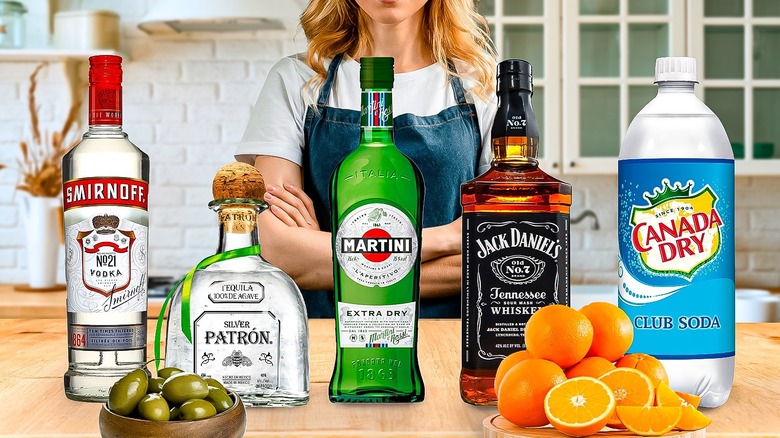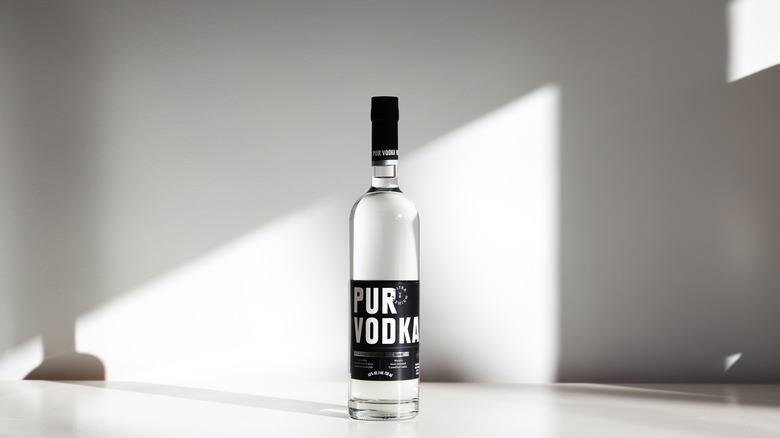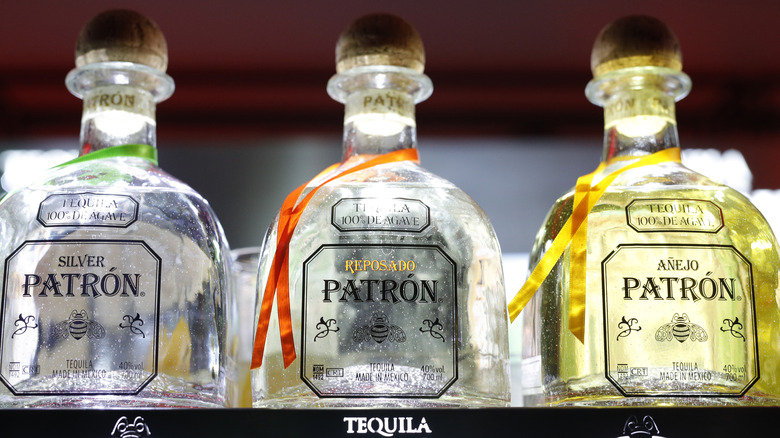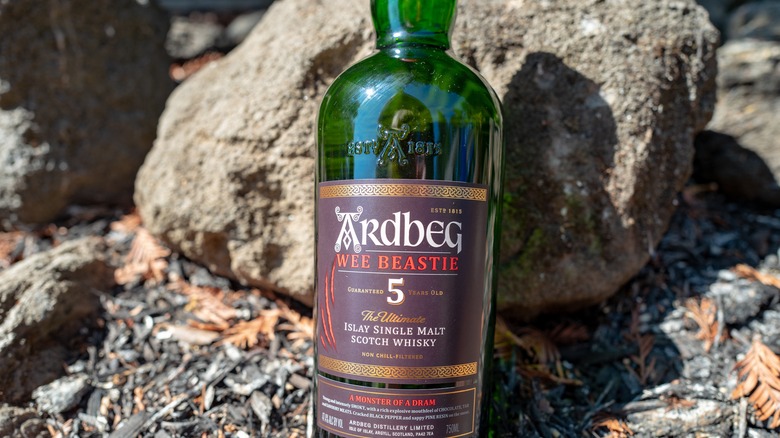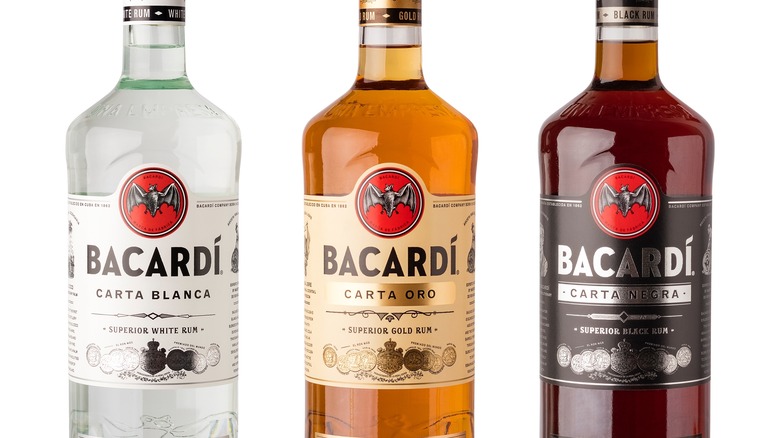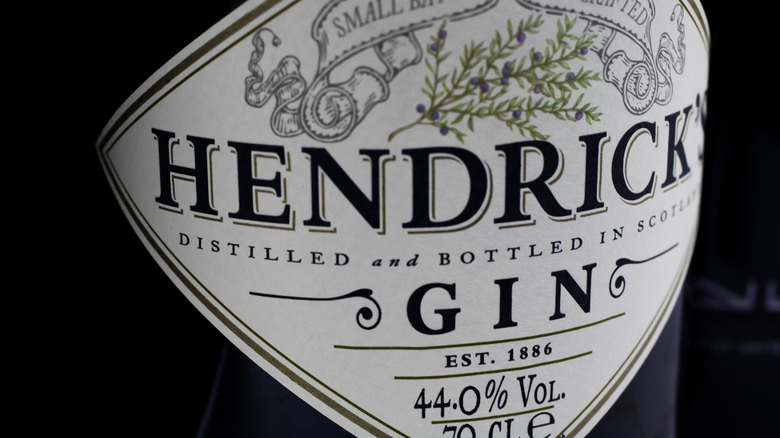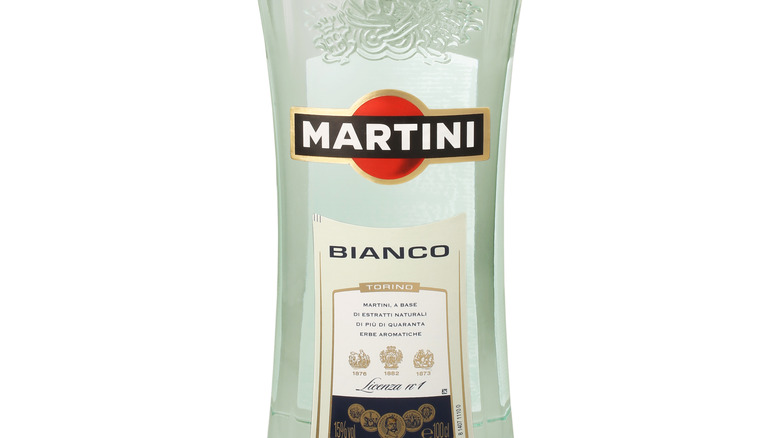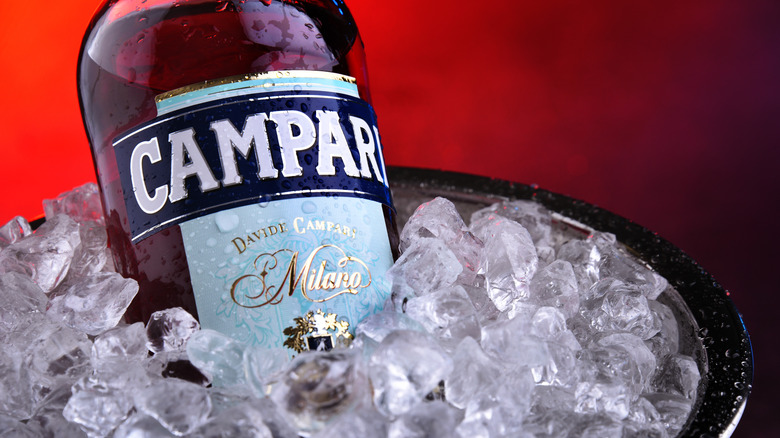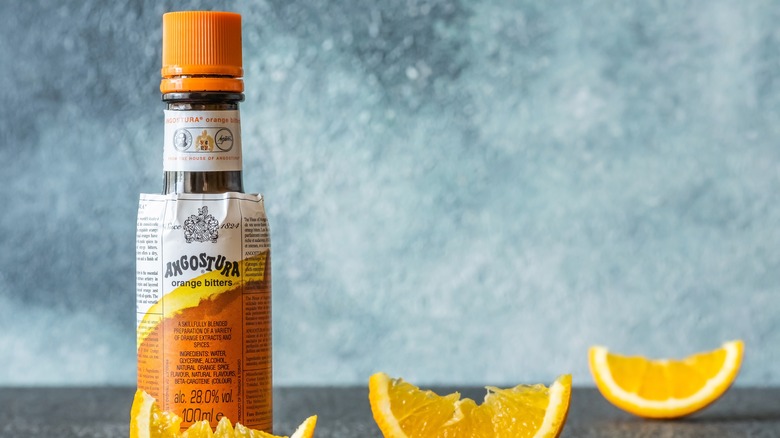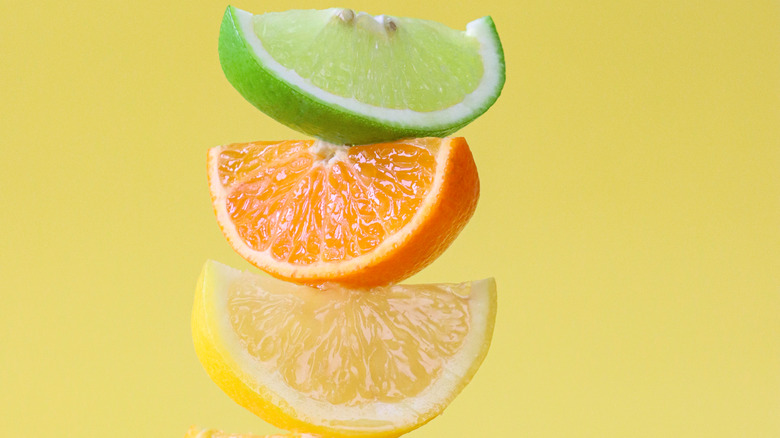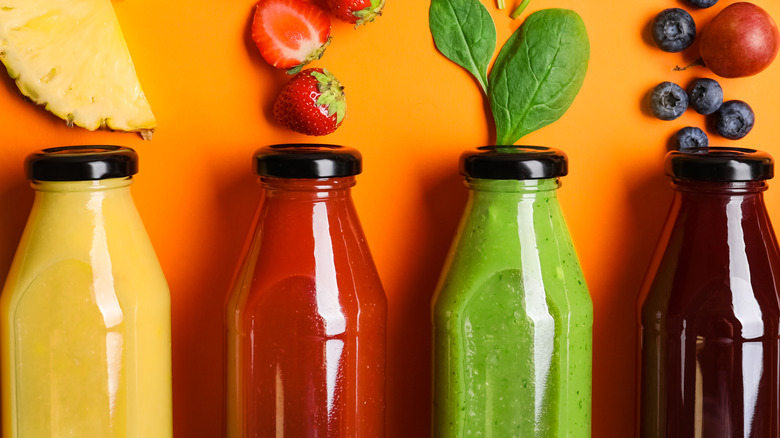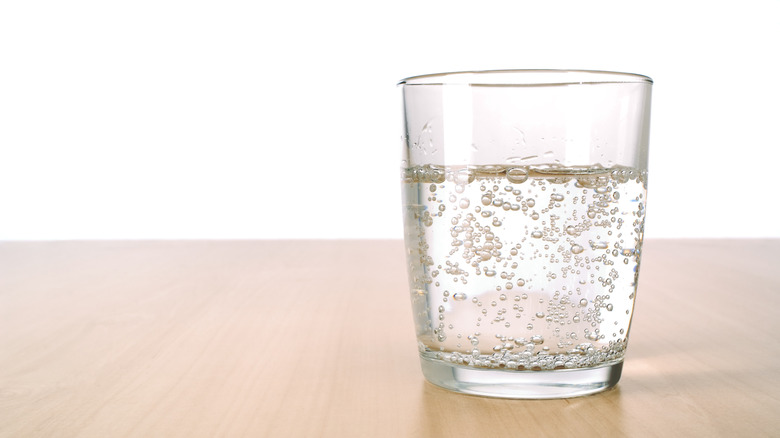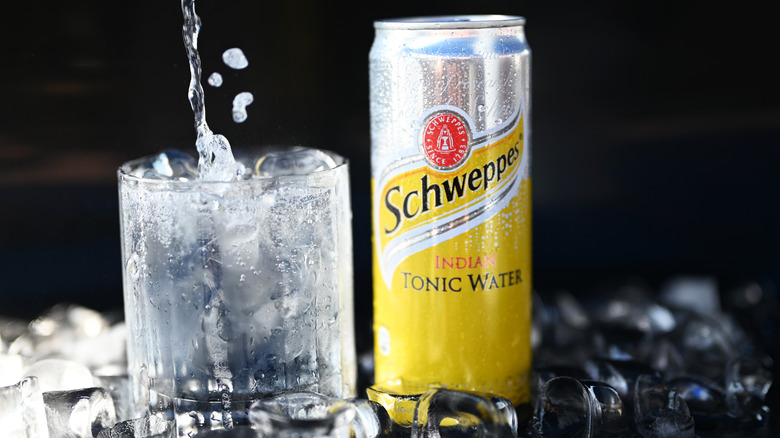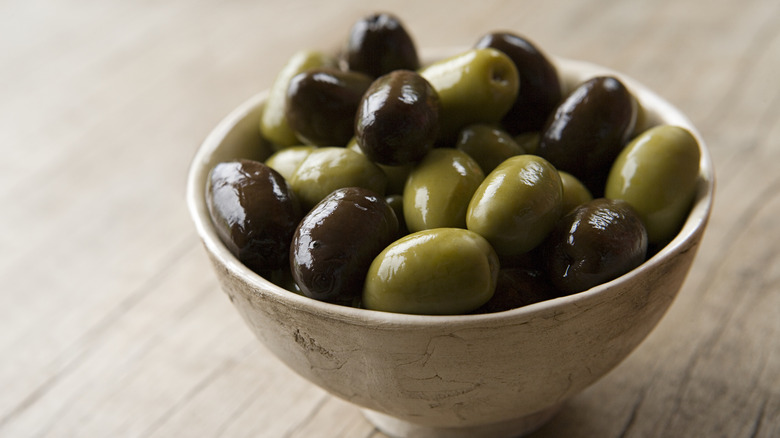The 14 Must-Have Ingredients For Home Bartenders
While we'll never deny that sidling up to your favorite local bar is a great way to spend an evening, sometimes you just want to drink at home. When you're in the mood for an adult beverage but don't want to leave your couch (or change out of your sweatpants), having a stocked at-home bar is key to being able to make drinks that rival the quality of your local watering hole — or at least good enough to get the job done.
From must-have bottles of liquor to aperitifs to cocktail-building essentials, there are plenty of must-have items you should stock up on to keep your home beverage-making-ready at all times. Although purchasing these items is a bit of an initial financial investment, we promise you'll save money in the long run if you pivot towards enjoying more drinks at home. Becoming a good home bartender means you'll never have to think twice before inviting guests over for a drink or hosting a cocktail party.
Vodka
If you want something versatile, vodka is the way to go. While it might not have the most going on in terms of flavor (though the idea that it has to be totally flavorless is an outdated misconception), it's perfect for serving as the base of cocktails that range from bright and bubbly to stiff and spirit-forward.
A slew of classic cocktails features vodka as the primary spirit. Think Martinis, Cosmopolitans, Moscow Mules, and more. Plus, let's be realistic — sometimes you want a drink at home without too much effort. Since you can basically add vodka to any mixer, this spirit makes low-effort drink-making easy.
Though we recommend going for something that's nicer than the stuff you'd find at a dive bar or college party, you don't necessarily need to buy a top-shelf bottle to get something tasty and drinkable. Some of the absolute best vodkas are reasonably priced, which can ease the financial burden of stocking your bar cart.
Tequila
If you're like us, the only thing you need to hear to be convinced to buy a bottle of tequila is the word "margaritas." That said, we (begrudgingly) admit there are other reasons besides being able to whip up a delicious round of margs that make adding tequila to your bar cart a good idea. Palomas, tequila sodas, and of course, shots all become possible when you have a bottle on hand.
The most important thing to remember when buying tequila is to look for bottles that are labeled as 100% agave. Bottles that lack that designation (which are technically called mixto tequilas) contain other ingredients like distilled sugar cane and glycerin. Price can really be your guide here since most mid-range tequilas are the 100% agave stuff.
If you're only going to buy one type of tequila, go for a nice bottle of blanco. If you're open to purchasing more — or you love to sip tequila on its own — a reposado can be a good investment.
Whiskey
No bar is complete without a bottle (or a few bottles) of whiskey. It's easy to be intimidated by this category of spirits because there's so much variation, but getting started doesn't have to be complicated. We recommend grabbing both a bottle of bourbon and a bottle of rye. We won't get into the nitty-gritty of what sets these two apart, but essentially bourbon is primarily made from corn and tends to be sweeter, while rye is primarily made from (you guessed it) rye and features spicier flavors.
Use the rye to make Manhattans, the bourbon to stir up Old Fashioneds, and whichever you're in the mood for to sip straight or over ice. Once you've stocked up on the basics, you can expand your collection to include other options like Irish or Japanese whisky.
While we always recommend avoiding super cheap bottles, the choice is yours when it comes to how much you want to spend. You can certainly find great bottles for less than $30, or you can splurge and go into the triple digits.
Scotch
Scotch is another type of whiskey, but its distinct flavor profile (and typical uses) make it worthy of a category all its own. In order for whiskey to be considered Scotch, it must be made in Scotland and be distilled from malted barley. Different styles of Scotch boast different flavor profiles, but many popular brands feature a smoky, earthy flavor that comes from the peat that's used in the production process.
You can definitely find cocktail recipes that use Scotch as the base liquor, but generally speaking, most people enjoy Scotch on its own. This means if you're going to splurge on one of your at-home bar purchases, it might as well be Scotch. Being able to pour a nice dram of the good stuff after a long day feels grown up and elegant, and you can even transfer the contents of your bottle to a crystal decanter if you really want to feel fancy.
Rum
If you want to be able to make refreshing, tropical, or tiki-inspired cocktails, you're going to need a bottle of rum. If you want to be able to make a simple mixed drink like rum and coke, you're going to need a bottle of rum. And if you want your home bar to feature a full selection, you're going to need a bottle of rum.
Now that you're (hopefully) convinced, let's talk about the types of rum you need to add to your collection. Rum is interesting because, depending on the style, one type of rum can taste radically different from another. Some are sweet, mild, and light, some are warm and spiced, and some are funky and vegetal.
While we encourage you to explore rum in its more unique expressions eventually, it's usually wise to start with a bottle of white rum for maximum versatility when making drinks at home.
Gin
Every serious at-home bartender should be able to make a gin martini — which means you need a go-to bottle of gin on your bar. If you need some tips on selecting the right type of gin for your martini, it's important to have a grasp on the main styles of the spirit. Heading to your favorite cocktail bar and experimenting with popular styles like London Dry and Plymouth can help you learn what you like. However, if you don't feel like giving yourself a "Gin 101" class, opting for a nice bottle of a London Dry-style gin is a good idea if you're going in blind.
Gin isn't just for martinis. You can also make other classics like Negronis or whip up easy crowd-pleasers like gin and tonics. Once you get started, it's easy to become a gin enthusiast, and you might find yourself adding new bottles to your gin shelf before you know it.
Vermouth
Vermouth is a major component in a range of delicious, classic cocktails. It's an aromatized wine that comes in two major styles: sweet and dry. The sweet stuff is essential for Negronis and Manhattans, while the dry variety is a key ingredient in martinis. Even if you already know how important vermouth is for making popular drinks, you can do more with this powerhouse ingredient than you may realize. Use it in a spritz, sip it on the rocks, serve it with soda, or even cook with it in dishes that usually call for standard wine.
There are a few important things to keep in mind when it comes to stocking your bar with vermouth. Unlike the distilled bottles in your collection, vermouth has a limited shelf life — and it must be kept in the fridge once it's opened. Even when stored correctly, you'll still need to finish your bottle within about a month, so we recommend sticking to smaller bottles unless you plan to do some serious at-home drinking (nothing wrong with that!).
Bitter Aperitifs
Aperitifs are an expansive and complex category of beverages, so we'll stick to the basics here and focus on the bitter, red varieties like Campari and Aperol. Having one of these on hand allows you to whip up a variety of drinks at a moment's notice. Plus, you can drink them with soda water when you need something light on the alcohol but heavy on flavor.
If Campari is your bitter of choice, you can certainly make Negronis, but you can also make Spagliatos, Americanos, and more. If you decide to go with a bottle of Aperol, the obvious way to use it is in an Aperol Spritz. While we could drink spritzes all day long, we still encourage you to branch out and try using it in something like a Paper Plane. There are also tons of delicious Aperol alternatives on the market, so don't be afraid to experiment!
Bitters
One sure-fire way to make your at-home creations taste like what you'd order at your favorite cocktail bar is to include bitters. You can think of bitters as the salt and pepper of cocktails — small additions that act as the crucial finishing touch to various drinks. Trust us, even if you don't necessarily taste the bitters in your beverage, we promise you'd notice something was missing should they ever be omitted.
You can find bitters in practically every flavor you can imagine. However, before you go crazy with walnut, sage, or jalapeno bitters, you must ensure your bar is stocked with a good ole bottle of Angostura. These bitters feature herbaceous, botanical notes and are essential in drinks like Old Fashioneds. All you need is a few drops to add complexity, depth, and a professional edge to your drinks. The best part is a single bottle will last you ages, so once you buy a bottle, you'll be good to go for a while.
Citrus
Simply stocking your bar with a variety of spirits will suffice if all you plan to do is drink your liquor on its own. However, most people enjoy drinking cocktails from time to time, and one of the most common components in drinks, both simple and complex, is citrus. Think about it: You can't make a margarita without lime juice. You can't make a whiskey sour without lemon juice. And you can't garnish an Old Fashioned without an orange twist.
Throwing a few lemons, limes, and oranges into your cart the next time you're at the grocery store will make whipping up a drink on the fly easy. Even if you're just pouring yourself a whiskey ginger or a vodka soda, adding a citrus wedge to the rim of your glass will make your drink look complete and the drinking experience more enjoyable. Plus, it never hurts to have citrus on hand for cooking.
Juice
In a perfect world, every cocktail would contain freshly squeezed juice from produce in peak season. Unfortunately, the world isn't perfect, and sometimes it's just not possible to use fresh stuff. We're the first to admit that keeping a few bottles of store-bought stuff is a smart idea if you like making drinks at home. Hey, we don't really want to juice our own cranberries, either.
Not all store-bought juice is created equal. Look for brands that are labeled as 100% juice and don't contain any additives — your at-home cocktails deserve the best! Pineapple, cranberry, and grapefruit juice are all nice to have in the fridge, but you can also get more creative and go for something like mango or guava nectar when you're in the mood for something more unique.
If your idea of making a cocktail is spiking a glass of juice, that's totally fine. However, consider adding a nice garnish and a cute paper straw to make it feel more special.
Club soda
If you have club soda and booze, you can make yourself a highball (which is really just a fancy way of saying a spirit and mixer over ice). Vodka soda, tequila soda, whiskey soda, gin, and soda — the list goes on and on. Simply mixing liquor with club soda is also one of the "healthiest" drinks you can make because club soda doesn't contain any sugar or calories, and you'll reap the benefits of hydrating while you imbibe.
While the options we listed above are obvious, you can (and should) mix club soda with things like vermouth and Campari. It's also the final, bubbly touch in cocktails like an Aperol Spritz and Tom Collins. You can even add a splash of seltzer to cocktails that don't call for the ingredient when you want to lighten them up and add an extra hit of refreshing effervescence.
Having club soda on hand is also nice when you have a guest who doesn't drink alcohol. When you serve it in nice glassware with a pretty garnish, non-partakers won't feel left out of the beverage fun.
Tonic water
If you need a quick, classy drink, you can never go wrong with a G & T. There are dozens of brands out there, but since this bubbly beverage usually makes up a significant part of drinks that contain the stuff, we recommend going for one of the best tonic brands on the shelves. We promise it will make a difference!
Though most people default to mixing tonic with gin, it also works well with vodka. If you're feeling adventurous (or your liquor supply is running low), you can branch out and mix tonic with tequila or even Cognac. The bittersweet tonic flavor also goes well with aperitifs like Lillet and Cynar.
Tonic really benefits from a little citrus, so be sure to add a squeeze of lemon or lime when you're making your next tonic-based concoction. If you're making G & Ts, try adding garnishes that complement the flavors and botanicals in your gin. For example, try adding sliced cucumbers if you're making a Hendrick's gin and tonic.
Olives
Equal parts visually appealing garnish and delicious snack, olives are an edible bar essential. They're the perfect salty, briny addition to a dirty martini. However, martinis aren't the only cocktail to which you should consider adding an olive. If you've ever been to Italy, then you know that olives are often served with Aperol spritzes. The salty bite of olives works beautifully with the bittersweet flavor of the traditional Aperivo hour favorite, and we highly recommend trying the combination if you haven't.
Don't be afraid to get a little fancy when purchasing olives. They last for a long time in the fridge, and using an artisan garnish will make even the most mediocre martini better. Consider buying blue cheese olives, pimento-stuffed olives, or Castelvetrano olives to really amp up your at-home concoctions. Plus, you can serve olives on their own when you need a snack to accompany your drinks.
